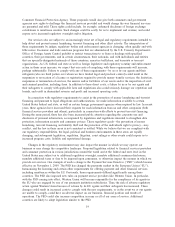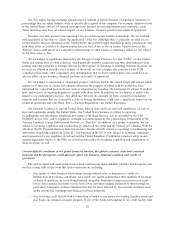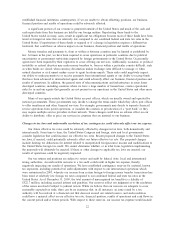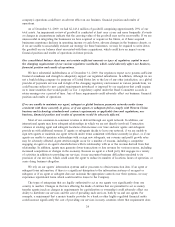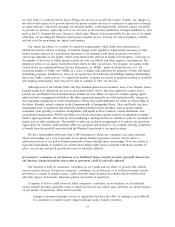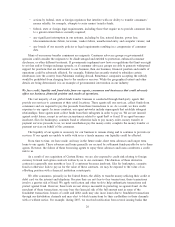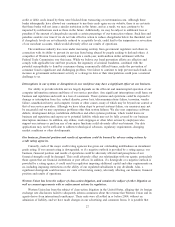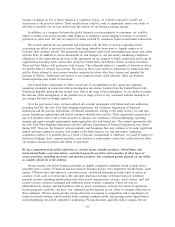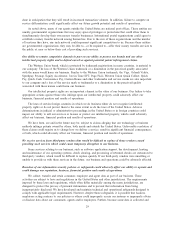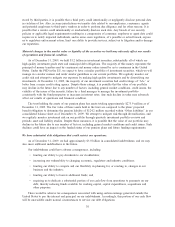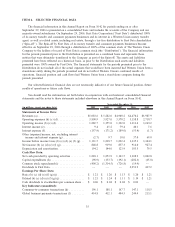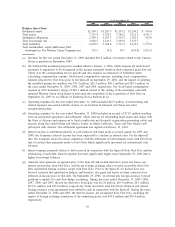Western Union 2009 Annual Report Download - page 41
Download and view the complete annual report
Please find page 41 of the 2009 Western Union annual report below. You can navigate through the pages in the report by either clicking on the pages listed below, or by using the keyword search tool below to find specific information within the annual report.credit or debit cards issued by them were blocked from transacting on westernunion.com. Although these
banks subsequently have allowed our consumers to use their cards again on our website, there is no certainty
that these banks will not issue a similar restriction in the future, and as a result, we may continue to be
impacted by notifications such as these in the future. Additionally, we may be subject to additional fees or
penalties if the amount of chargebacks exceeds a certain percentage of our transaction volume. Such fees and
penalties escalate over time if we do not take effective action to reduce chargebacks below the threshold, and
if chargeback levels are not ultimately reduced to acceptable levels, could lead to the suspension or revocation
of our merchant accounts, which would adversely affect our results of operations.
The remittance industry has come under increasing scrutiny from government regulators and others in
connection with its ability to prevent its services from being abused by people seeking to defraud others. A
competitor of Western Union recently entered into a multi-year, multi-million dollar settlement with the
Federal Trade Commission over this issue. While we believe our fraud prevention efforts are effective and
comply with applicable law and best practices, the ingenuity of criminal fraudsters, combined with the
potential susceptibility to fraud by consumers during economically difficult times, make the prevention of
consumer fraud a significant and challenging problem. Our failure to continue to help prevent such frauds, an
increase in government enforcement activity or a change in laws or their interpretation could pose a material
challenge to us.
Interruptions in our systems or disruptions in our workforce may have a significant effect on our business.
Our ability to provide reliable service largely depends on the efficient and uninterrupted operation of our
computer information systems and those of our service providers. Any significant interruptions could harm our
business and reputation and result in a loss of consumers. These systems and operations could be exposed to
damage or interruption from fire, natural disaster, power loss, telecommunications failure, terrorism, vendor
failure, unauthorized entry and computer viruses or other causes, many of which may be beyond our control or
that of our service providers. Although we have taken steps to prevent systems failure, our measures may not
be successful and we may experience problems other than system failures. We also may experience software
defects, development delays, installation difficulties and other systems problems, which would harm our
business and reputation and expose us to potential liability which may not be fully covered by our business
interruption insurance. In addition, any strikes, work stoppages or other labor actions by employees who
support our systems or perform any of our major functions could adversely affect our business. Our data
applications may not be sufficient to address technological advances, regulatory requirements, changing
market conditions or other developments.
Our business, financial position and results of operations could be harmed by adverse rating actions by
credit rating agencies.
Currently, each of the major credit rating agencies has given our outstanding indebtedness an investment
grade rating. If our current rating is downgraded, or if a negative outlook is provided by a rating agency, our
business, financial position and results of operations could be adversely affected and perceptions of our
financial strength could be damaged. This could adversely affect our relationships with our agents, particularly
those agents that are financial institutions or post offices. In addition, if a downgrade or a negative outlook is
provided by a rating agency, it could result in regulators imposing additional capital and other requirements on
us, including imposing restrictions on the ability of our regulated subsidiaries to pay dividends. Also, a
significant downgrade could increase our costs of borrowing money, adversely affecting our business, financial
position and results of operations.
Western Union has been the subject of class-action litigation, and remains the subject of other litigation as
well as consent agreements with or enforcement actions by regulators.
Western Union has been the subject of class-action litigation in the United States, alleging that its foreign
exchange rate disclosures failed to adequately inform consumers about the revenue that Western Union and its
agents derive from international remittances. These suits were all settled in or before 2004, without an
admission of liability, and we have made changes in our advertising and consumer forms. It is possible that
27




